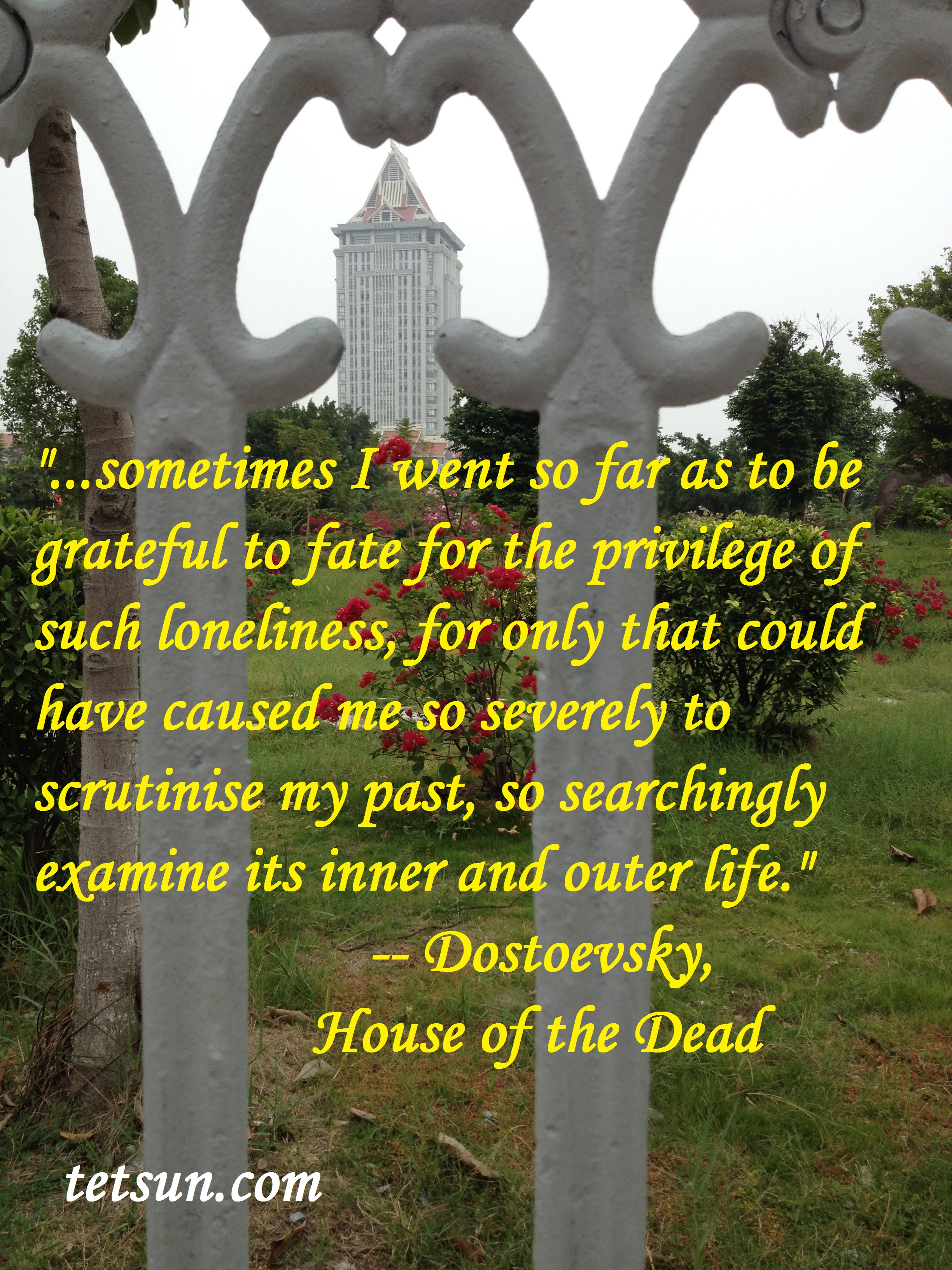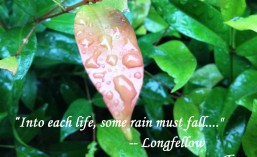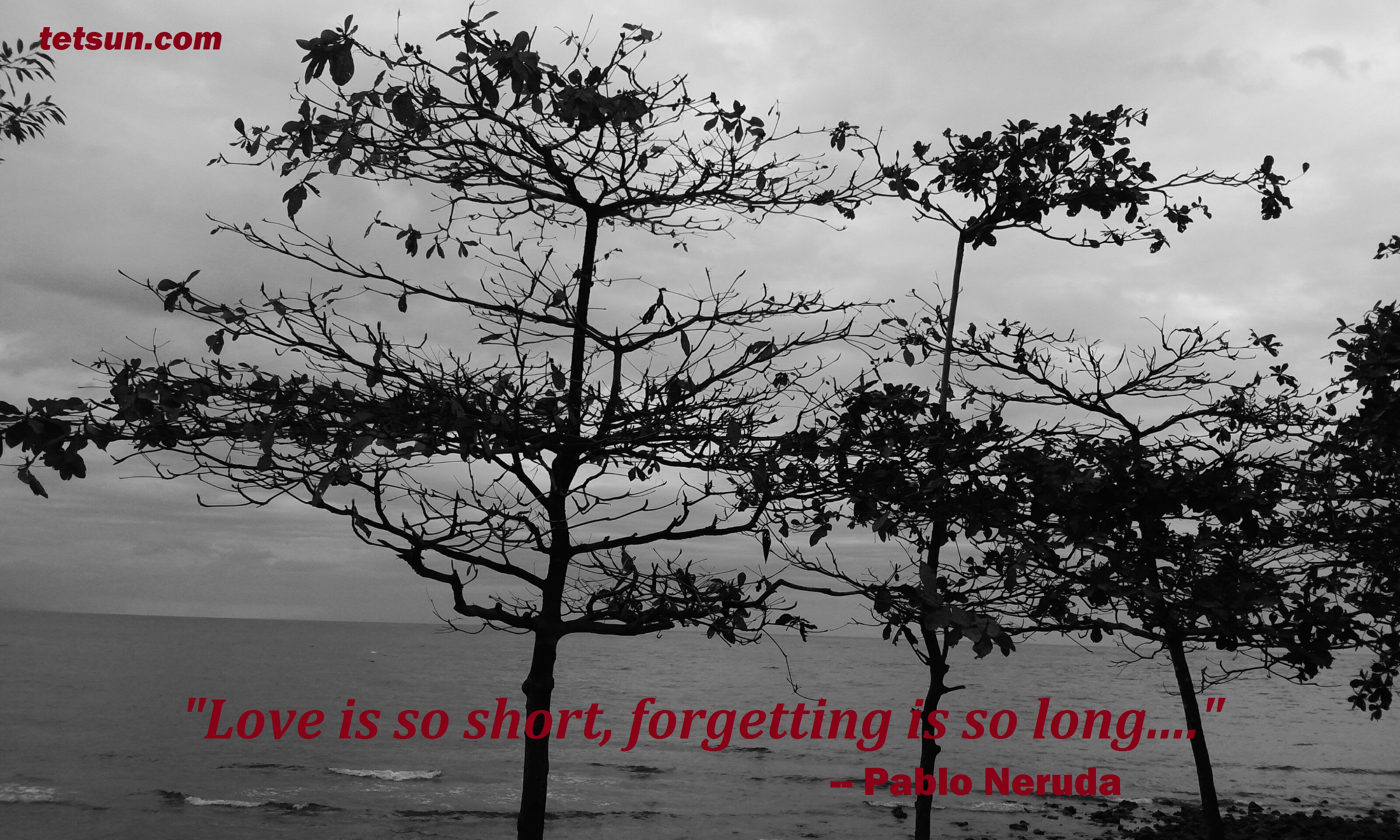Tag Archives: Relationships
Perfect: A Haiku

You’re not the kindest,
Nor the sweetest, gentlest one —
But you’re you — perfect!
On friendship and marriage

This year is the 14th year my husband and I have been married. It may not be that long for those who have been married for at least two decades, but I am grateful we have come this far and are as committed to each other as we were on our wedding day.
As I reflect on my marriage, I feel so grateful that my husband still has the patience to stay married to me. I joked about it with my Facebook friends, but in all honesty, I really am grateful. I am not a very easy person to live with — I can be really mean to my husband, but we do find more reasons to laugh about with each other than reasons for meanness.
I don’t think there’s really any special secret to a lasting marriage — friendship and commitment are all that’s needed.
Tempo: A Haiku
Passion vs Commitment

Today I read a passage about following rules to show one’s faith or having passion about your faith. The writer didn’t like the idea that rules, after being observed mechanically “can be followed with minimal effort and almost no thought.” Passion is deemed more important.
This made me think about how people often prefer the definition of love as an emotion, particularly passion, rather than as commitment, especially in marriage.
Emotions are unreliable.
You cannot force yourself to be passionate about something. You cannot will passion. But you can will yourself to do something even if you have no passion for it.
Marriage is not for grown ups who think like kids. They are not for people who think of their partners as toys they can get rid of once they lose interest in it and find it boring.
Growing up with a mother who had no qualms talking about her problems with her then young daughters, I knew from a young age that marriage had its ups and downs (especially because my mother was such a drama queen and I say that with no disrespect but with a fondness for her whom I miss every day still, even years after she passed on.) There were days when she and my father were this sweet couple, slow dancing to a Nat King Cole song. And there were days she did not speak to him at all
Had my parents given up on each other after their first or hundredth fight, I wouldn’t have been here in this world. And my mother wouldn’t have been there holding my father’s hand on the night he died.
They were married 35 years and were each other’s best friend. I know there were times they both felt they could no longer stand each other, probably questioned whether they still loved each other whenever they had a fight, but as devout Catholics in a country with no divorce laws, they remained committed to staying together, if not for themselves, then for their daughters. And it was the right decision to stay together as they became even closer after my father was diagnosed with a heart disease. My mother took very good care of my father in the last few years of his life, and mourned him for a long time after he died. Even though she complained about my father so many times whenever they fought, when he died, she just remembered how good my father was to her.
If we only rely on our emotions, none of our relationships will be safe from falling apart. Rules may be rigid, but they can help us from going astray. Passions will fade, but if two people in a relationship are both committed to each other, then they will work to keep that relationship strong.
So near, yet so far

Seen from a distance
Laughter heard across the miles
But untouched — unreal
——
Technology has made our lives easier and communicating with family more convenient.
Yet, somehow seeing your loved on the screen of your computer or phone or iPad is not the same as holding their hand or hugging them.
Online communication still seems so unreal.
Maybe it will feel “normal” in the future. Maybe.
Happy Tuesday!
T.
Responsibility, Emotional Maturity and Heartbreak

When someone I am genuinely close to (like one of my best friends or my sisters) makes what I think is a poor decision or does something I find childish, I tend to say, “Jeez, how old are you?” Of course, they are free to say the same thing to me when they think I’m being silly. But they have “nicer” words to say!
How old are you really?
We, humans, have three types of ages: chronological, biological and psychological age.
Our chronological age is the number of years we have been alive. Our biological age refers to the age of our body’s systems. Some people who are 50 years old may have the body (health) of a 40-year old. One who is 25 years old may have a biological age of 50. Finally our psychological age refers to our cognitive functioning and emotional maturity. Some people may be 50 but have the cognitive ability and emotional maturity of a teenager! ( Like someone I know who thinks he has the emotional maturity of a 13-year-old! Self-awareness is important though!)
This is just my observation: if a person does not like or fears becoming responsible for another person, it will be difficult for that person to reach emotional maturity. Being in a relationship where you are committed to one person whose happiness means more to you than your own happiness is a stepping stone to reaching emotional maturity. I think this is why most of us in our youth go through that period of becoming head over heels in love with somebody who later breaks our heart into tiny pieces that we feel can never be put back together again. But the truth is, as we find out, our hearts are only as resilient as we want them to be.
If we have gone through heartbreak and are mindful of our experiences, we can prevent ourselves from going through the same heartbreak again. Mindfulness is necessary in achieving emotional maturity. Something I learned in my early twenties as a young woman trying to become a nun which I value to this day is how we sometimes fall into a pattern of behavior, and I witnessed myself several times over the past decade almost getting suck into a pattern again. Fortunately for me, I have more responsibilities and commitments; I know my priorities, and I am much more aware of myself and my weaknesses.
My point is, one does not have to suffer so many heartbreaks if one truly endeavors to learn something from the experience.
You can extricate yourself from the pattern if you sincerely want to free yourself of it. But you have to want it. If you do not have other responsibilities and commitments you can anchor yourself into, it will be even more difficult to disentangle yourself from this pattern.
Are you stuck in a pattern? Does the same story of heartache keep playing out in your life?
Look within.
Would you rather be beautiful/handsome or hot? 😉

A week ago, one of my best friends who is dating someone new, asked me what kind of compliments women liked to hear. He had thought I’d be flattered when he said my hair looked beautiful, but instead I simply answered, “I already know I have beautiful hair.” [insert wicked laughter]
But I did say that I don’t think I’d feel comfortable with hearing, “You look beautiful” because I know I never looked or even felt beautiful. And that is not being insecure or belittling myself. That is simply the truth. Other women would probably like to hear men tell them they’re beautiful. Everyone’s different.
My husband often tells me I am cute, and he has the same look on his face as a person who looks fondly at a puppy, when he says that to me. I guess I look like a pet to him. It’s not romantic, but it’s good enough for me.
When I asked my friend what compliment he would prefer this new woman to say to him, he said he would indubitably choose to hear that he is “hot” except that nobody has ever said that to him [he gets “handsome” too many times; it has no effect on him.]
Then I thought to myself, perhaps all men feel like this — they prefer to be seen as sexually attractive rather than just aesthetically attractive. My curiosity led me to ask around 90 people, co-workers, students (current and former) and some Facebook friends (I know and have met every single person I have as friend on Facebook) from 14 to 65 years old the question (with a slight variation from the original one)
Which (compliment) would you prefer to hear from a person of the opposite sex:
a. you look cute
b. you look great
c. you look beautiful/handsome
d. you look hot
(A few of my friends clarified that they would only expect it from a person with whom they are quite familiar.)
The answers I got were quite revealing. Majority of Chinese girls (19-25) and Filipino teenagers (boys and girls) prefer to be perceived as “cute.” Even my 16-year-old nephew picked “cute,” which I truly doubt! I had asked him the question in a group chat with him and my sisters (his mom included!) I am quite certain he wasn’t being honest!
Most of my male friends (except the ones I’m quite familiar with) chose “you look great.” When I asked them why they chose b, they said it is “all-encompassing.” One friend said he is too realistic and too old to desire to be called “hot” but if he were 25, then “hot” it would definitely be. Only very few of my male friends, 7 in fact (my 3 best friends and 4 other men I’ve known for years and have always been pretty transparent about their lives with me) admitted they prefer to be called “hot.”
Most of my female friends (ages 30-50) picked “you look great” or “you look beautiful.” Just like the men, they said “you look great” covers everything. But one friend said, “you look great” is boring! She and 6 other female friends (hey, just realized that’s 7 men and 7 women! Dang!) picked “you look hot.” These are women in their mid-40s to 50’s.
My one friend who is in her 30’s and has always been considered “hot” by everyone we know, picked “you look beautiful.” When I asked her why she didn’t choose d, she said she hears it too often that she just wants to be seen for what she is inside, spiritually, (not just inside her clothes). Hmm. I wonder what it’s like to be always told “you look hot!”
Only one friend, my classmate in high school, whom I haven’t seen in 20 years, gave me an answer that I’m sure 99% of my friends would have chosen had it been one of the choices. He said he would pick “e” that says: I’ll give you lots of money!
Note: majority of my friends are Asian. I am sure the results would be different if I included more non-Asians!
Which would you pick?
Have a fun weekend!💕
T.
On Not Being Able to Sleep Alone

My husband has been away on a 5-day trip, and I’ve not been able to sleep for the last two nights. The day he left, I made sure I exercised and kept myself busy and physically tired just so I would be able to sleep well at night. I watched TV, read a book. Nothing worked.
Yesterday, I did the same thing and thought perhaps a little alcohol would help me sleep. (I’m actually alcohol-intolerant, and I’ve been told more than a couple of times I shouldn’t drink, but I thought “just a small amount to make me sleep.”) It didn’t.
I have read articles that said women prefer to sleep alone. One of these says, “…women’s brain power was undiminished by sharing a bed. Indeed, we can sleep through most things; thunderstorms, gales, burglar alarms, breaking glass – anything except the sound of our babies crying. But our quality of sleep is certainly better when we’re sleeping solo.”
But that is not true of me. I cannot sleep alone. When I am supposed to sleep alone, no matter how tired I may be, I will just be tossing and turning in bed. I may be fine being alone all day, but I need my husband next to me when I sleep. I may not be able to sleep through the night, and sometimes awake to my husband’s snoring or sleep-talking, but I do not mind that (most of the time). I prefer to feel the warmth of a human body next to mine. And this is not just trying to sound cute.
I appreciate this explanation from an article on The Atlantic that says, “We sleep together not because it’s fiscally responsible, but because we are affectionate beings. Our minds need rest, but our minds also need camaraderie and intimacy and whispering. Anxiety and stress seem less intimidating when discussed with a partner while wearing pajamas. It’s important to talk about our days lying side by side, discuss children and household situations, gossip about neighbors and colleagues, plan for tomorrow in the confines of private chambers. We cuddle. We laugh. At the end of each day we remove the onerous cloaks we’ve donned to face the world, and we want to do this lying next to our best friends, to know we’re not in it alone.”
That best describes how I feel about bedtime.
The good thing is I don’t have to start work till two days from now, which means I have not had to get up early and had been able to take afternoon naps. In a couple of days, my husband will be home again but until then, I have to find ways to make me sleep.
What do you do when you can’t sleep?
Daily Prompt : Compromise

We’re not children,
We don’t need to fight over petty matters,
It shouldn’t matter who has the last witty retort,
In fact there’s no need for a retort
Nor for the cause of such.
Let’s be the grown ups that we are.
Compromise.
——-
Daily Prompt: Compromise
Self-made Prisons: Thoughts on Dostoevsky’s The House of the Dead
 I just finished reading Dostoevsky’s House of the Dead or Prison Life in Siberia, and as I was reading about the different people he met in prison — the ones he liked, disliked, tried to avoid — I couldn’t help feeling life itself is like a prison. This feeling was made stronger after a friend complained about the shamelessness of a former colleague who had lied about his condition to the employer. He said he couldn’t stand working at the same place as this unscrupulous person. So I said to my friend, “I told you this is like prison. You can’t choose your prison mates!” 🙂
I just finished reading Dostoevsky’s House of the Dead or Prison Life in Siberia, and as I was reading about the different people he met in prison — the ones he liked, disliked, tried to avoid — I couldn’t help feeling life itself is like a prison. This feeling was made stronger after a friend complained about the shamelessness of a former colleague who had lied about his condition to the employer. He said he couldn’t stand working at the same place as this unscrupulous person. So I said to my friend, “I told you this is like prison. You can’t choose your prison mates!” 🙂
The main character, Alexander Petrovich, a noble, observed the peasants in the same prison he was in and said, “…you’ll never know what is at the bottom of the man’s mind or heart. You may think you know something about him, but it is all optical illusion, nothing more.” Isn’t this true of people, in general? It is truly impossible to know one person fully. How many times have you been surprised or shocked by something done by a person you think you know inside out, something so out of character?
Petrovich also said this of Suchiloff, the man who volunteered himself to serve the former, “It is indeed difficult to know a man, even after having lived long years with him.”
In our lifetime we sometimes have to live, study or work with people we do not like. It is stressful to always try to be polite with them, which we still do because it is what we were taught to do since we were kids. Be nice. Be polite. Be courteous. Perhaps we can learn from the main character, Alexander Petrovich, how to deal with the oppressiveness of a “prison,” surrounded by people with whom we are not comfortable: “I soon understood that work alone could save me, by fortifying my health and my body, whereas incessant restlessness of mind, nervous irritation, and the close air of the barracks would ruin them completely. I should go out vigorous and full of elasticity. I did not deceive myself, work and movement were very useful to me.”
Sometimes we create our own prisons. If we are aware that we put ourselves there, then we can get ourselves out of that prison. Unless we are too afraid of freedom, just like some convicts in Dostoevsky’s time “…poor devils who commit crimes in order to be sent to hard labour, and thus to escape the liberty which is much more painful than confinement….”
Why do some people stay in an unhealthy relationship for decades, for example? Could it be being in “prison” where their role is set is less painful? Or the person they are with, no matter how vile, is predictable and therefore not as petrifying as the uncertainty that freedom brings?
I think each of us has his own “prison.” Some have luxurious “prisons” — they have a materially rich and luxurious environment, but inwardly they are tortured by their own demons. Others probably have even worse than the barracks in Siberia in the 19th century — economically poor, uneducated, unemployed living in squalor among those who want to be forgotten by society. And there are those who have just enough — neither too much nor too little — but they get bored easily, so they create their own “prisons” and for some time their minds are “occupied” as to how to get out of it, and they may or may not admit to being responsible for creating it.
The House of the Dead, like all the other novels by Dostoevsky that I have read, leads the reader to think and re-think ideas or previously held ideas about humanity — individually and as a group. One critic of Dostoevsky berated his endless psychologizing and philosophizing, but to me, these are exactly what made his novels achieve greatness. His characters are people that readers get to know deeply, and with whom we can relate because underneath all the masks worn and personality and experience of each one, is a real human being, and no matter how vile a character may be, because we get to know him, then we understand and have compassion.
I know I’ve said this before in this blog: the more Dostoevsky works I read, the more I admire the man, the more grateful I am for his words.
(The House of the Dead by Fedor Dostoieffsky with an Introduction by Julius Bramont)
Goodbyes
Some goodbyes are sweet —
You smile and hug and kiss
And say the word, believing
That you’ll be better people
When you see each other again.
Some goodbyes are bitter —
You turn your back
Perhaps with tears
Or with a frown, hoping
You’ll never have to see each other again.
Some goodbyes are not meant to be —
You think it is over
That the last chapter has been written
And another one cannot be added.
But then a sequel is started.
Some goodbyes are inevitable —
You hate to part
You know you shouldn’t
But you’re not characters in a book
Or lovers in a rom-com….
These goodbyes leave you feeling cold and empty
Like a house stripped
Of every furniture, curtain and picture,
Of every sign of being lived in,
And all that’s left is a hollow sound
And the echo of one’s sigh
And the memories of a voice…
Such is the goodbye that, in my ear,
You gently whispered
As you kissed away
A tear on my cheek
And softly,
Quietly
Left me
For good.
*****
“Love is so short, forgetting is so long..” is a line from one of my favorite Neruda poems, “Tonight I can Write.” I think it’s a beautifully sad poem that captures not only the pain one feels at the thought that love has gone, but also the courage to imagine that the person one has loved so passionately will eventually move on.
Tonight I can Write by Pablo Neruda:
Click here for the English and Spanish versions.
Click here to listen to Andy Garcia’s reading of the poem.
Love on a Gloomy Day

Beauty in the eyes of love
It’s cold and cloudy in Jimei again. I’ve already said this several times this week: This weather is depressing.
But luckily, there are people who can see the sun behind the clouds. Figuratively speaking, of course.
Yesterday, I was walking with a young friend, who was gushing about a guy she’s in love with. She thought I was a mind reader because I knew exactly how she’s feeling and what went on in her head whenever he failed to reply to her text messages right away. Sigh.
She was very happy and kept smiling. She said she even noticed herself smiling while walking alone even though it was raining.
Been there, done that.
But I’m happy and excited for her. I don’t plan on telling her to be ready for the heartaches. Anti-climactic. (But you, dear readers, who I’m sure are older than my friend, if you’re suffering from a broken heart, might be able to help yourself recover by reading this article on the science of a broken heart — a good read.)
My young friend’s happiness and excitement makes me think that falling (romantically) in love is perhaps the most effective cure for pessimism. To one who one is in love, even a single dead leaf looks beautiful.
Perhaps it is better for us to always feel like we are madly in love because, then, everything can be beautiful; every little thing can make us smile.
Of course, that is not possible (or is it?)
I guess we are all entitled to falling madly, stupidly in love once in our boring lives.
I wonder if there is such a thing as falling smartly in love?
On Age, Music and Chemicals in the Brain
A few days ago, I came across this interesting post on serotonin and dopamine and was reminded of it yesterday as I was listening to the songs of Barry Manilow. (OK. Please. Just be patient with me. I do have a point I want to share.)
When I was younger (“…so much younger than today…”) whenever I heard Barry Manilow’s songs, I would sing along until I cried (Yeah, I was that disgustingly dramatic.) I would think of the guys that I liked but didn’t even know I existed, or the guys that I liked but were not free, or the only one that broke my heart to pieces. (Who would not cry listening to “Even Now” and “Somewhere down the Road”???)
Now that I’m in my 40’s and in a stable, loving relationship with my husband of 10 years, and together raising a child, I feel absolutely nothing when I hear the songs that used to make me cry and later make me smile. When I listened to those same songs yesterday, there was not even a sigh. Nada. It seemed like that part of my mind or my heart just disappeared!
My husband thinks it’s just because I’m over that time in my life. Well, I have been over that period in my life for years now. But I used to have fond memories of that time. Now, even that fondness is gone.
So I wonder if those chemicals in my brain are up to something, or I am just getting old or already old.
Do old songs still make you cry or smile or angry? Do they have any effect on you at all?
Neruda’s “If You Forget Me”: A Lesson in Loving

Centennial Park, Iligan, Philippines
Whether Pablo Neruda wrote this poem for his country, Chile, or for his wife, Matilde Urrutia does not make much difference to me. I like the kind of love portrayed in this poem. I like the tone of the speaker as he warns his lover …
“If you forget me
I want you to know
one thing. ”
It is not the sound of a desperate, pathetic lover who begs or promises to continue to wait even though the other has moved on.
It shows a speaker who thinks and is not controlled by silly emotions, a speaker/lover who demands reciprocity in a relationship.For truly, if one can be, and is reasonable, one will demand reciprocity in a relationship.
(Even God demands, commands love and faithfulness!)
“If suddenly
you forget me
do not look for me,
for I shall already have forgotten you.”
Who wants to be forgotten by the one person you cannot forget? Of course, trying to forget someone is easier said than done. The more you try to forget, the more you will be reminded. This is perhaps the speaker’s way of saying, “Don’t think I will be pining for you. I will forget you before you can completely forget me!”
“If you think it long and mad,
the wind of banners
that passes through my life,
and you decide
to leave me at the shore
of the heart where I have roots,
remember
that on that day,
at that hour,
I shall lift my arms
and my roots will set off
to seek another land.
“…and my roots will set off/ to seek another land.” This is how it should be. One should be brave in seeking and starting a new life and not waste time and energy on someone who has forgotten.
Yet….
Though the poem begins with a kind of warning, a threat as to what the speaker can do should his lover forget him, it ends with a promise, an enticement as to what he can give if his lover remains true to him,
“…ah my love, ah my own,
in me all that fire is repeated,
in me nothing is extinguished or forgotten,
my love feeds on your love, beloved,
and as long as you live it will be in your arms
without leaving mine.”
Reciprocity.
On Forgiveness and Second Chances
I have often wondered what Jesus meant when he said one should forgive seventy times seven (Matthew 18:21-35). I don’t think anyone will take that literally (like 490 times), but I guess it means many, many times.
If God could forgive the world for what the world did to His Son (unlike Leonardo diCaprio’s character in The Revenant), then how could we, mere mortals, not forgive our fellow mortals?
But that’s just it. We are not God. We can try to forgive one person many, many times, but in the end the other gift that God gave us –reason, logic — would teach us to protect ourselves from being fooled, cheated or hurt again.
My question then is, is it immoral to refuse to give someone who has betrayed you, lied to you, hurt you, for the nth time, a chance for the nth time?
In the parable, the king sounded like a businessman, a moneylender who was compassionate enough to cancel a slave’s debt and actually “let him go”, after the latter begged the king to give him time to pay the debt.
Say for instance, the parable ended there, and the slave did not beat up a fellow slave who had owed him, would the king have trusted the same slave again? Would he have lent him money again? I don’t think so.
My point then is, yes, we can forgive people for the many times they betrayed our trust,for the many times they hurt us. But I think only a fool would give the same amount of trust to traitors/wrongdoers.
To me, forgiveness means accepting the fact that one was wronged, and not wishing the wrongdoer any ill, and actually sincerely wishing him well. But it does not necessarily mean giving him a second chance. Rather, it means letting him go his own way. Alone. Peacefully.
“Fool me once, shame on you; fool me twice, shame on me.”
Of Exciting Beginnings and Boring Endings
 Dr. Faye Miller of “Mad Men”
Dr. Faye Miller of “Mad Men”“Mad Men: Tomorrowland (#4.13)” (2010)
Don Draper: I met somebody and… we’re engaged.
Faye Miller: Are you kidding me?
Don Draper: I know, I know. It’s a surprise. It was for me, too.
Faye Miller: Jesus. Who is she?
Don Draper: What’s the difference? I fell in love. I didn’t mean for this to happen. You’ve been very important to me.
Faye Miller: So you’re not going to put an ad in the “New York Times” saying you never liked me?
Don Draper: Faye.
Faye Miller: Well, I hope you’re very happy. And I hope she knows you only like the beginnings of things.
Quote Source: http://www.imdb.com/character/ch0303746/quotes
Two totally unrelated happenings I was a witness to today reminded me of this line from Faye. In fact I have never forgotten this line ever since I heard it because I think in relationships, everyone is guilty of this. Well, perhaps not everyone, but most people.
This morning in a restaurant, I sat at a table for two, and next to mine was a table for six and there sat a septuagenarian-looking couple. Instead of sitting directly across from each other or next to each other, they sat diagonally opposite each other, directly facing an empty seat. And they were just eating. In silence. Companionable silence, perhaps, but they seemed lost in their own thoughts. Only one time did the woman say something about the food without even looking at the man, and I just heard the man make a sound like “hmm.”
This scene was in sharp contrast to the text messages I was receiving from my friend, who has met somebody new whom he says he’s not interested in romantically, but who he cannot stop talking about. His excitement over a new person he has met (and this has happened several times in the few years I’ve known him) amuses me. I enjoy observing his reaction and understanding how men think, and reminiscing the times I, too, got excited about meeting somebody new.
When you meet somebody new that you like, you cannot stop thinking about them and getting in touch with them and telling your family, friends, and anyone who’s willing to listen, about how wonderful/cool/nice they are. To me, it’s like being in high school all over again, where every word that’s spoken (now, texted or posted on social media) by said person seems to be directed at you or is related to your “friendship”; every gesture or action seems to be a code you have to decipher (when, really, there is no hidden meaning whatsoever.)
Dr. Faye Miller, being a psychologist, must know that Don’s behavior or preference for beginnings is all too common. But knowledge does not equal acceptance, especially when that knowledge hurts our feelings.
I like exciting beginnings, but I can’t bear boring endings. I don’t like how after a few weeks of “friendship”, your “friend” acts like you don’t know each other. It’s something I experienced in my youth, and I often hear from young friends who ask “Why? What happened? What did I do?” Sigh. (It’s what you didn’t do.)
One thing I’m grateful for, being in my 40’s, is the wisdom to see through exciting beginnings. Most of them don’t last. But one can work on it, I guess. They don’t have to have a boring ending. I know I wouldn’t want my husband and me to end up not looking at each other anymore, or worse, not talking. After 9 years, we still talk a lot about the things we both are interested in, and laugh at ourselves and at each other in a loving way.
I would not trade that for an exciting beginning that has an uncertain ending.
May you always have exciting beginnings that won’t have boring endings! 🙂






